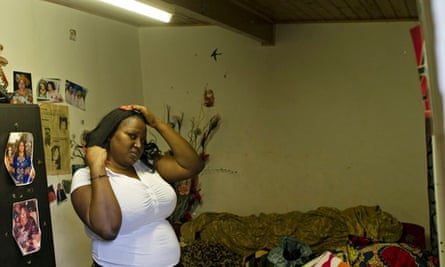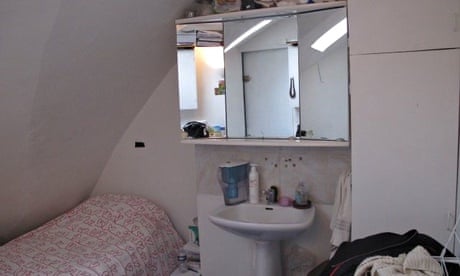Sophia moved to Paris two years ago from her native Rio de Janeiro. She lives in a converted storage room on the sixth floor of her landlord's building, close to the Champs Elysées. The room, which has a sink, measures less than 5 square metres and costs Sophia €350 (£290) per month, or €70 per square metre.
There used to be a kitchen in the corridor, until her landlords ripped it out after trying to force her to leave. "One night I came home to find they had used a lock I don't have the key for. I had to call a locksmith to open my home, which cost €400. So I didn't have enough to pay my rent the next month."
Sophia is unable to find alternative lodgings due to her modest revenue. "If I could leave, I would – trust me, I have looked. When I first arrived, I thought these small, expensive spaces were the norm in Paris. It's only when I brought a friend here one day and he explained it is illegal to rent out this sized room that I realised I was being abused."
The housing crisis in Paris dates back more than a century to the golden years of the belle époque – when the city could not grow fast enough to satisfy a population finally freed from the cares of war and revolution. But according to the Economist Intelligence Unit's latest cost-of-living report, Paris is now the second most expensive city in the world after Singapore.
The price of rented accommodation is so inaccessible that many workers on modest pay are having to take up illegal and substandard rooms rented out by modern-day marchands de sommeil, or "sleep vendors" (the term originally described those who rented beds by the hour to 1950s workers in shantytowns on the outskirts of Paris).
Last year, housing action group La Fondation Abbé Pierre (FAP) uncovered the case of Dominique – a now 50-year-old temporary worker who had spent the past 15 years living in a tiny former chambre de bonne (maid's attic room) that measured just 1.56m x 1.56m. One of many such rooms being rented out illegally, Dominique paid a monthly rate of €330 (£271). He had no access to a shower or toilet, just a sink in his room. "We didn't live, we survived," he told French radio station RTL. "But we ended up saying it's either that or living out on the streets."
Prior to Dominique renting the room, it had been on the books of three different estate agencies. He has taken legal action to claim back the 15 years' rent from his landlady. "Dominique should be compensated for the abuse he has suffered; the rent should be reimbursed in full because his vulnerability was abused – but also it is necessary to make an example of the landlady," said FAP's chief executive officer, Patrick Doutreligne. "Even prison cells aren't as bad as some of these lodgings." The final verdict is due on 24 March.
Under French law, to be deemed fit for habitation, a living space needs to be a minimum of 9 square metres and 1.80m in height, and possess adequate heating, running water, electricity and access to a bathroom, shower and kitchen. Many landlords, however, are still renting out converted cupboards, garages, cellars or chambres de bonne. The FAP estimates one-fifth of all housing issues it deals with concern illegally small accommodation, and that more than 3.5 million people across the country are living in unacceptable accommodation.
Doutreligne describes it as "a serious abuse of the poor in renting out these sorts of places on a permanent basis. These illegal lodgings must be reported and landlords sanctioned if we want to protect human dignity".
In France there are a great many obstacles to renting a place. The tenant must earn three to four times the rent; they must provide pay slips, references, work contracts, identity papers, bank account details and tax declarations; and all are required to have a guarantor. But above all, excessive demand plus various gentrification projects are causing property prices to sky-rocket (buying an apartment in Paris now costs an average of €8,000 (£6,600) per square metre).
"If a place costs more than €30 per square metre to rent per month, it's too much," said Jean-Baptiste Eyraud, founder of housing rights association DAL (Droit au Logement). Penalities in the form of taxes and fines are in place for landlords who rent rooms illegally, but they are easily evaded according to Eyraud.

Looking through properties to rent on France's three biggest online accommodation websites, it does not take long to find illegal rooms. One landlord was offering his 7.5 square metre room for rent at €420 (£346) per month, or €46 per square metre. Another lodging, advertised by an estate agent, was a chambre de bonne, supposedly of 9 square metres, located on the seventh floor of a decrepit building in the upmarket 17th district of Paris. Without an elevator and with shared toilets, it was on the market for €380 (£312) per month. When I measured the room, it was just over 5 square metres.
Claiming he had already climbed the seven floors that morning, the agent handed me the keys and told me to have a look at the room unaccompanied while he waited downstairs. When I finally reached the top floor, the long corridor was filthy with dust that looked like it had accumulated over several months. The room, equally grimy, was shockingly small. When the sofa bed was unfolded, it left hardly any room to move around. A narrow shower cubicle had been fitted besides the sofa – one could only imagine the humidity in the room after showering. "It's a small room, but it's just perfect for a student because it has everything you need," said the agent when I returned the keys.
I also met Aissatou, originally from Guinea, who lives in a ground-floor 25 square metre space, without double-glazing and minimal heating for £585 (€710) per month with her three boys, aged three, six and nine – whose puffy faces confirm their suffering health from the humidity due to the exterior walls being dampened every time it rains.
Aissatou sleeps in a bed with her three-year-old, while the two older boys sleep in bunk beds in the same room. The conditions are cramped. "I don't understand why we end up having to settle for this sort of accommodation when we work," said Aissatou. "The hygiene commission has judged that the landlord needs to renovate the space, but instead he's kicking us out. My work contract has ended and we have nowhere else to go."
According to the FAP's study, there are currently 800,000 severely overpopulated lodgings in Paris that are unfit for living. Aissatou's application for council housing was finally accepted in January, but she isn't confident.
"I know people with 'urgent' applications that have been waiting for eight years. They told me I'm registered as an urgent case and but that it could take up to six months, but even six months is too long for an 'urgent' situation. If a single mother and three growing children isn't one of the most urgent cases, then what is?"
"The government is breaking the 2007 Dalo law by not placing the vulnerable in decent housing," said Eyraud. "They [the Paris council] could re-house people in private housing – housing that is left empty – but they don't because it costs them too much," said Eyraud. Last January, the Guardian revealed that 11m homes across Europe are empty, 2.4m of which are in France.
Following the FAP's 19th report released in January, the housing minister, Cécile Duflot, announced that "2014 will be the year of the realisation of a real action plan in favour of people recognised as a priority by the Dalo law". Currently, 57,000 families living in vulnerable conditions are registered for priority housing.

According to Doutreligne: "The best solution is the 'grand Paris' project, whereby the government is extending the city beyond its borders, that is currently being implemented," he said. "If the government enlarges the city intelligently, it could resolve the housing problem."
But in the meantime, said Eyraud, "The bottom line is that the council needs to do its job and house people that really are a priority because pushing destitute people out onto the streets in the end, is the same as condemning them to death."
* The names of the tenants in this article have been changed
* This article was updated at 14:38 on 7 March to correct the areas of the rooms in question






Comments (…)
Sign in or create your Guardian account to join the discussion